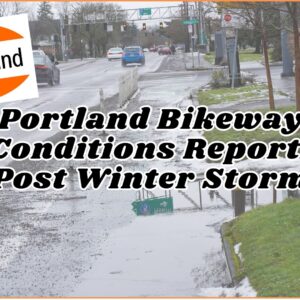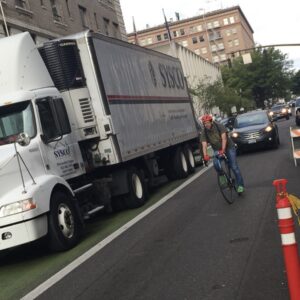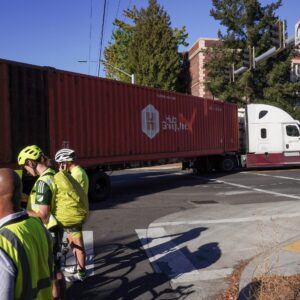Big trucks are bad for dense urban areas. They spew toxic exhaust that poisons our bodies and our environment, they take up precious space, and they far too often kill people due to their inherently unsafe design features. We should do whatever we can to limit their presence.
Fortunately there are other options. Like pedal and battery-powered cargo bikes.
Advertisement
Yesterday I happened upon a three-wheeled cargo trike at work on Southeast 2nd and Pine. It was a vehicle owned by Portland-based B-Line Sustainable Urban Delivery.
B-Line employee Anthony Dryer was making deliveries for Marukin Ramen, a Japanese restaurant with a small outlet in Pine Street Market. The back of his trike was full of food prepared in the kitchen of Marukin’s flagship location less than a mile away (just across the Willamette River). Dryer, who also works as a mechanic on the bikes when he’s not riding them, said his load was about 300 pounds. He makes about 15-20 similar deliveries on an average day — to B-Line’s many local customers. The company also makes money by promoting brands and displaying advertisements on the side of the trikes.
As Portland continues to grow at a rapid pace and our streets fill with people who are not encased in a protective shell, B-Line and similar companies like Portland Pedal Power, are well-positioned to be the future stars of our local freight economy. We should do everything we can to help them flourish.
— Jonathan Maus, (503) 706-8804 – jonathan@bikeportland.org
Our work is supported by subscribers. Please become one today.







Thanks for reading.
BikePortland has served this community with independent community journalism since 2005. We rely on subscriptions from readers like you to survive. Your financial support is vital in keeping this valuable resource alive and well.
Please subscribe today to strengthen and expand our work.
Very nice. I wish Parr Lumber had bicycle parking.
I once had a lumber supplier refuse to sell to me if I was going to bring it home, all of one mile, on my bike. It was an inconvenience to go get a motor vehicle just to haul a bit of lumber, and arguably less safe. Twenty-four foot long boards aren’t any problem to carry on a bike, I’ve done that and more many times, but carrying them on a pick-up was nerve-wracking.
ive taken many a load of sometimes ridiculous stuff (300 lbs of 16′ 2x(4-16)s… multiple sheets of plywood… *way* too much bagged concrete…) on my cargo bike from parr lumber on ne mlk over the last 10 years. theyve never batted an eye about me pulling through in the line just like i was a “normal” truck.
This is terrific. I love what B-Line is doing for freight delivery! Unfortunately, until we outlaw large trucks from the majority of Portland streets (including greenways, which should be a no-brainer!) bike freight will remain a niche market.
Agreed. This problem needs to be attacked at both ends.
– Absolutely no articulating trailers in the city
– Side and rear under-ride protection required
– Additional blind spot mirrors
This needs to happen at the state level, but that is unlikely. I would like to hear a city council or mayoral candidate talk about this major safety problem.
For small, light loads and short distances okay. But for most deliveries, uh-uh. Urbanites still like lots of stuff. BIG stuff!
Several deliveries probably fit within 800lb and a few miles. A 1000W rated motor (looks like this has an ecospeed) peaks around 2hp. A big truck can do a long route and has 8x the space, but how much time is spent parking or circling due to limited agility?
Dig the mudflaps. I always wonder about the visibility with that huge box. How about a tall trike with the rider on top of the box? That would add the rider’s weight to the suspension damping but it would have to be a swing bike to improve roll-over cornering speed with the delta configuration.
those guys seems pretty cool whenever I meet them…
however, they are not immune to idiocy in the way they park illegally like motorized vehicles…
I know this is an old post, but they park on sidewalks because legally they aren’t allowed to park on the street or even in designated loading zones.
There’s a place for such services, but this hardly qualifies as freight.
Adding an additional intermodal cog requires facilities to transload/crossdock within reach of bicycles. Currently, Portland is splattered with close-in rail yards only serviced by trucks. The DCs are actually further out. Even before T6’s closing most of Portland’s freight entered via rail or trucks beating rails via I5. Drayage moves freight from the rail yards back out to the DCs off Marine Drive/Rivergate (for example).
Real freight has long been a legit hurdle Portland. Local Sysco deliveries aside (something electric Sprinters, etc could solve), the rail yards dice our land (the peninsular cut), and block more accessible bike routes (UP yard/North Portland Greenway). This without mentioning the amount of road space a 53′ foot trailer takes up.
Skipping a bunch of points, if we’re going to re-imagine local deliveries, we really need to start in Asia.
Read/listen to Joe Cortright and City Observatory (http://cityobservatory.org/about/) for a well-informed analysis of freight in our economy. Sorry the link isn’t specific, but I don’t have time to get it.
I like the idea of prohibiting trucks in certain areas and certain routes ( high pedestrian, greenways, high volume bike commuting etc during certain hours. Then have any freight that needs to be moved during prohibited hours go on cargo bikes. This will take a cultural change for many involved from companies getting deliveries, to beer distributors to people moving in to a new apartment. But one look at the food delivery trucks trying to park in the middle of Williams during the day tells you our current system is insane and dangerous.
Go bikes!
If you want to see how biking Portlanders and International freight cargo interact on a regular basis, come on over to SE 26th and Gladstone streets and spend an hour watching the constant flow of ancient diesel trucks hauling 52′ containers and bikes of all types try to occupy the same narrow streets. Luckily for the freight and rail companies, the new Portland Mayor has already come out and said he wants to promote more throughput of these trucks in Portland so Chinese pigs can eat Oregon alfalfa and other efforts in making Portland a cross-roads for globalized commodities. So much for safe routes to school in this part of town….
We should all be following and pushing for:
https://olis.leg.state.or.us/…/Measur…/HB3310/Introduced
oops: https://olis.leg.state.or.us/liz/2015R1/Download/MeasureDocument/HB3310/Introduced
Oregon HB 3310
The other day, I passed a local 99-cent store here in New York City. The store had just received a delivery. On the sidewalk were 16 six-pack boxes of bleach, in three different sizes between 64 fluid ounces and 128 fluid ounces. That amount of bleach (assuming an average of 96 fl oz per bottle) weighs about 40 lbs per box. Sixteen 40-lb boxes weigh in total about 612 lbs.
There were about the same number of boxes of ammonia (but harder to count because they didn’t say “BLEACH” in big black letters on the boxes). Assume the same number and that’s more than 1,200 lbs of cleaning supplies on the sidewalk.
Assuming each bottle costs $1.50 at retail, the total shipment of 192 bottles of bleach and ammonia costs $288. Assume the distributor takes about 1/4 of that, or $72 (half to the manufacturer, and another quarter to the retailer).
Now, my cargo bike setup maxed out at about 500 lbs capacity. So that amount of bleach and ammonia would be three trips. To one 99-cent store. For a total of $72, which divided three ways is $24. That’s about what I would pay one rider for two hours of work. Delivery of cleaning supplies is not a financially sustainable line of business for a cargo bicycle company.
Another issue: bicycles or tricycles can’t stack their loads as high as trucks can. The lower the stack, the more surface area the delivery has to take up. Financial considerations aside, it will take up more street space or sidewalk space to deliver by cargo bike than by truck. One caveat to this calculation is that the truck is often half-empty, however.
It would be great to see an analysis of the number of large truck deliveries in portland that could be replaced by cargo-bike deliveries. Maybe this is already defined. If not it would be a great place to start in tackling this problem. Comm. Fish’s office must be working on this given his concerns about the inefficiency of traffic flow in Portland.
The real purpose of cargo bikes like these is not to help be a cog in the trip of the 2000 mile salad . They can be a piece of the puzzle that allows us to relocalize the production of everything. If we are to face up to the fact that Americans can not go on using 35% of the resources of the earth with 5% of the population cargo bikes make perfect sense. Maybe we should not be Hauling Budweiser from ST.Louis on huge trucks or trains then transferring it to big trucks to bring to a local pub. Perhaps the beer brewed a 1/2 mile away should just be hauled down the street to the pub on the cargo bike. Cheap energy and closing our eyes to climate change has fooled us in to believing we deserve the choice of 100 imported beers, or watermelons in January or shoes from Sri Lanka. But perhaps trying to make most of what we need nearby, and hauling those things on cargo bikes will save us and save the world at the same time.
Beer is a great example; it’s heavy, perishable, and we make tons of it locally. And yet, we still import plenty of inferior product (because, let’s face it, all other beer is inferior). If we can’t stick to local beer, I don’t see how we can do so with other products.
Unless drastic changes are made to lifestyle, there’s only so much localization that can occur. Every product requires a number of inputs and while it sounds insane, it could easily be more efficient to transfer stuff halfway around the world — especially if the inputs for a product have to be shipped from many sources.
In terms of miles per gallon ship can transport a ton of cargo 532 miles, a train can transport it 202 miles, and a truck 61 miles. https://en.wikipedia.org/wiki/Energy_efficiency_in_transportation Introducing lots more vehicles which themselves require many inputs, even small ones, can lead to inefficiencies very quickly.
Bikes are super efficient when you only need to move a person or a small amount of stuff — why expend the energy to move a motorbike weighing many hundreds of pounds or a car weighing thousands of pounds when all you really need is a person to go from point A to B. But as you start hauling more, it makes less sense.
Well thanks a lot. You just ruined my business plan for exporting landscaping stones to New York using my bike trailer.
An electric cargo bike gets something like 500mpgE and navigates downtown better than a ship — maybe even in Venice. Trikes like that can only carry 1/4 ton?
Think of them more like long-distance pallet jacks or hand trucks. They could make big trucks more efficient where space is at a premium and eliminate medium-large urban truck traffic. e.g. Instead of parking a UPS truck in the bike lane, stop a big trailer somewhere with plenty of room and easy access from the highway, load a pallet onto a trike and go deliver within a few miles loop (or not a loop if the big truck is driven by someone else.)
Some stores get 4-5 pallets off a truck one night per week, but making many small stops will run into much more congestion and unpredictability.
One of the larger internet grocery delivery services does this in New York City, but uses $300 push carts instead of $6000 tricycles. Hiring pushers instead of riders is also cheaper (can be paid less) and costs less in workers’ compensation (bicycle workers have very high workers’ comp costs).
It puts a smile on my face whenever I see a B-Line trike out in the world. I’m glad Portland has this option, and I’m glad there are local businesses that use it.
I like these things as well as anytime I see people using smaller, quieter, safer vehicles for transport/delivery.
Frankly, big trucks are efficient when they’re the right tool for the job. They’re somewhat like trains in that people regard them as a nuisance, but the alternative would be to put a lot more other things on the road.
I am curious about comments suggesting there’s a problem with overuse of big trucks — where is this happening? Yeah, I don’t particularly like riding with them, but there is no incentive for businesses to use trucks that are larger than necessary. They’re more expensive to operate and they certainly can’t get around.
The electric bikes are fine for short hops when not much stuff is carried (i.e. light delivery work), but you can’t actually use them to actually haul stuff. But I see these things just about every day and as the city gets more jammed and traffic more hopeless, I expect to see more.
I’ve seen quite a few large trucks on Clinton Street and other bicycle routes. Any route the city seems as “cycle-priority” should not allow these lumbering vehicles.
Which section would that be? That simply has not been my experience. Clinton is a lightly trafficked street that is so slow that there is a strong disincentive for cars to be on it. It’s slow enough that even cyclists have to treat it like a wide MUP rather than a regular street. Many of the roads that feed onto it are narrow that big things don’t fit. And what exactly are these trucks doing?
I encounter them regularly on larger roads near industrial and commercial areas as these areas require them to function. But I don’t encounter them tooling around on narrow residential roads and greenways — no driver would want to drive on one of these without a good reason.
Thanks for posting! I am always happy to see them out on our streets, delivering goods throughout Portland!
I continue to use my bike for projects here in SE Portland, and I use it primarily for hauling my tools and some materials. With bigger jobs, I am having Mr. Plywood deliver my materials, and when replacing a fence, I use a pickup to haul wood waste to Wood Waste Recycling in NE, so I am not 100% carbon-free. I think the idea is serve locally, and not be hauling a monster pickup from Vancouver to do work here in PDX. I think it’s a good idea to tread lightly, and be accountable to my neighbors who hire me to do projects. By the way, I am celebrating 5-years of being in business, and I still do a majority of my transportation by bicycle. It can be done.
We contacted the NJ & NYC DOT regarding small pedal powered vehicles hauling up to 30,000 pounds in NYC. We have five of these pedal cars and looking to haul some serious freight.